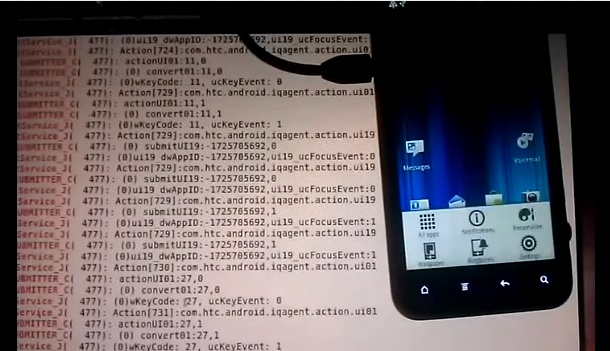UK mobile operators: We don't use Carrier IQ

UK operators have denied using the Carrier IQ mobile data-logger, which has sparked privacy concerns over its tracking of data usage on smartphones.

UK operators have denied using Carrier IQ data-logging software on their handsets, after a researcher posted a video (pictured) of the program recording keystrokes and other data. Image credit: Trevor Eckhart/YouTube
However, the software may still be on their customers' handsets, as none of the operators was able to tell ZDNet UK on Friday whether the app was on their devices anyway, placed there by the manufacturer.
Carrier
IQ is a 'mobile intelligence' tool sold by a California-based company of the same name
to device manufacturers, who embed it in their products to gather anonymised metrics data for operators. HTC and Samsung have admitted installing it on their hardware, and Apple has said it used it in pre-iOS 5 iPhones.
The software, which tracks much of the customer's data usage, has been described as a "rootkit" by a security researcher who publicised its widespread use. However, Carrier IQ has said (PDF) the tool is merely "counting and summarising performance, not recording keystrokes or providing tracking tools".
All four major UK operators told ZDNet UK that they do not use Carrier IQ. However, the picture was markedly less clear when it came to whether the smartphones they sell have the software on them.
Three said it does not use Carrier IQ. Vodafone said it does not add the software to its handsets, and never has. Everything Everywhere, which encompasses the T-Mobile and Orange brands, said it did not "install or activate" Carrier IQ. O2 said it does not put the software on its handsets.
"Our understanding is that the handset manufacturers might install it so that they can collect diagnostic data. But if they do, it's not on our behalf, and we don't have access to any of the data that may be collected," an O2 spokesperson said, adding that the operator was not aware of the app being on any of its phones.
Researcher discovery
The researcher who highlighted the use of Carrier IQ, Trevor Eckhart, found it on an HTC Android phone. Although he said it was present on other Android devices, on that particular handset he apparently found it to be logging keystrokes and reading both HTTP and HTTPS webpage details.
Eckhart called the app a rootkit as it gives privileged access to the smartphone while mostly evading detection. It cannot be uninstalled without rooting the device, it cannot be deactivated, it turns on when the phone turns on, and there is no opt-in.
Carrier IQ responded to Eckhart's publication of his findings by sending a cease-and-desist letter. The Electronic Frontier Foundation (EFF) stepped in and Carrier IQ backed off and apologised.
At the same time, the company said its software is intended only to make phones work better by identifying dropped calls, "trending problems" and "problems that impede a phone's battery life". It is also meant to make customer service "quicker, more accurate and more efficient", Carrier IQ said.
Firm denials
Nokia has denied reports that its devices use Carrier IQ's software. On Thursday, as US senator Al Franken weighed in with a series of questions for Carrier IQ, BlackBerry maker RIM also said it did not place the app on its hardware. Apple said it used to use it on iPhones but stopped with the iOS 5 release earlier this year.
Windows Phone product design chief Joe Belfiore said on Twitter that handsets using Microsoft's mobile OS "don't have Carrier IQ on them either".
HTC told All Things D on Thursday that US carriers "required" that the manufacturer install Carrier IQ on its phones. Verizon Wireless has denied requiring it, although Sprint and AT&T have both said they do.
Get the latest technology news and analysis, blogs and reviewsdelivered directly to your inbox with ="http:>ZDNet UK'snewsletters.